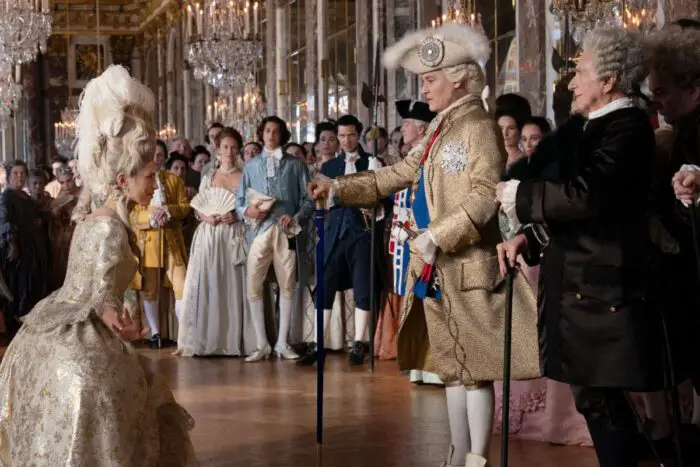Eyebrows were raised earlier this year when the news was announced that though it would not be competing for the Palme d’Or, the Johnny Depp starring vehicle Jeanne du Barry would have the honor of opening the 76th Cannes film festival. Depp remains a controversial figure as a result of his well publicized legal battle with ex-wife Amber Heard, and the film’s director and Depp’s co-star Maïwenn was herself accused of assaulting a journalist earlier this year. In light of this, Jeanne du Barry was always going to be one of the most controversial releases of the festival, despite the fact the film itself seems hardly worth it. It’s hard to imagine a film less primed to incense audiences for anything other than being so bland and middlebrow. A safe, conservative and maybe even slightly crass film, it feels somewhat out of date. It’s diverting but possesses little we haven’t seen before or deserves to captivate us today.
The title character featured in a supporting role in Sofia Coppola‘s biopic of Marie Antoinette, but here, the roles are reversed, with Jeanne in the protagonist slot and Marie as the rival across Versaille’s banqueting table. The film begins in Jeanne’s (Maiwenn) childhood, following her rise through the world as a sought-after courtesan, before her charms find her placed before the wandering eye of the king (Depp), who is charmed by the brazen woman’s sensuous beauty, unconventional humor, and willful disregard for protocol and seemliness—the very attributes that earn her the ire of the rest of the royal court.
As told by its director and star, the story of Jeanne de Barry is one of a bold, proto-feminist, working class icon who defiantly made her mark on a world that scorned and rejected her, embracing her sexual power and the social capital it gave her in a world structured around sating men’s desires. It’s a blandly celebratory vision, combined with a romantic vision of her affair with the king, and that’s not inherently a bad thing, but it does cap its appeal to those who won’t examine the implications of framing her story this way or demand a more nourishing vision. In one moment late in the film, an aghast Marie Antoinette exclaims “this is grotesque!” and her interlocutor responses, “no your grace, this is Versailles”. If that passes as subtle, well-written commentary in your eyes, then Jeanne du Barry might be for you.

If the filmmakers had any interest in exploring France’s history with a truly critical gaze, they’d have made Zamor the main character. A child slave (Ibrahim Yaffa) stolen from his homeland given as a gift by the king to his mistress who rises through French society to become a revolutionary? Give us that story please! In comparison Jeanne’s rise and fall (we all but skip the fall) is almost mundane. The film adorns its heroine with a halo where her relationship to Zamor concerned, she naively insists that her page is not a slave and the film doesn’t explore or challenge this assertion, with the adult Zamor (Djibril Bjimo) barely saying a word or even changing expression as he lingers in the background of scene after scene. Make fantasy if you wish, but this is just embarrassing, and I’m surprised a movie tried to peddle such a sanitized view of slavery in 2023.
Maïwenn’s direction shows the odd moment of exciting individuality but these are rare and subtle, mostly the film’s form is very typical and somewhat anonymous with its greatest strengths lying in the performances. Depp handles the demands of his role surprisingly well, delivering his lines in credible French and showing there’s still a little of the handsome rogue of his youthful roles in him, but there’s a sourness to his performance as well that benefits the role. He seems at all times genial and humorous, in a reserved, suppressed and mischievous way, one that Jeanne’s presence brings out of him, but there’s a darkness to the character as well and he embodies this rather effortlessly, as in, without ever seeming to try. As the title character, Maïwenn strikes an effective balance between naivety and brazenness. She’s a woman of the world, but not of this one, to which she is a living affront. Her endearing performance is the film’s sharpest weapon, as is her chemistry with her closest confidant le Borde, a gem of a performance by Benjamin Lavernhe.
Like its forebear Marie Antoinette, the film’s most significant fault lies in its inability to make the intrigue at court as scintillating as it is purported to be. The stakes are ill defined and there’s little emotional weight to the drama. When she is finally ‘accepted’ into the fold, her jubilation rings false and hollow, the meaninglessness of their acceptance is never fully vanquished, and though funny, the scene feels almost like self satire.
Jeanne du Barry is a funny, occasionally poignant costume drama with a sensibility less eccentric than some of its forebears and in some cases better for it. It doesn’t quite achieve the emotional resonance it aims for, not by fault of the performances which are strong throughout, but the historical cache it lends itself via its omniscient third person past tense narration isn’t justified by the tone which is far from rigorously historical or inquiring. It’s a piece of character drama and entertainment and though elegant, it’s most diverting when it embraces the lightness of its characters, Maiwenn’s direction brings some welcome energy that could’ve been intensified to better effect.
Perhaps they had hoped that casting Depp would give the film the air of scandal that surrounds its characters, but the film itself is anything but scandalous, telling its tale of love and propriety in a generally inoffensive and engaging fashion that’s unlikely to leave an enduring mark. Like that of its heroine, the influence of Jeanne du Barry is soon destined to be effaced from history by bolder reformers. It’s an old fashioned costume drama that doesn’t think too hard about the implications of it’s story, and if it had, it might have found something genuinely subversive or meaningful to say, but as it is, it’s a lightweight piece of pop feminist drama with too little credibility to call much of a success.


